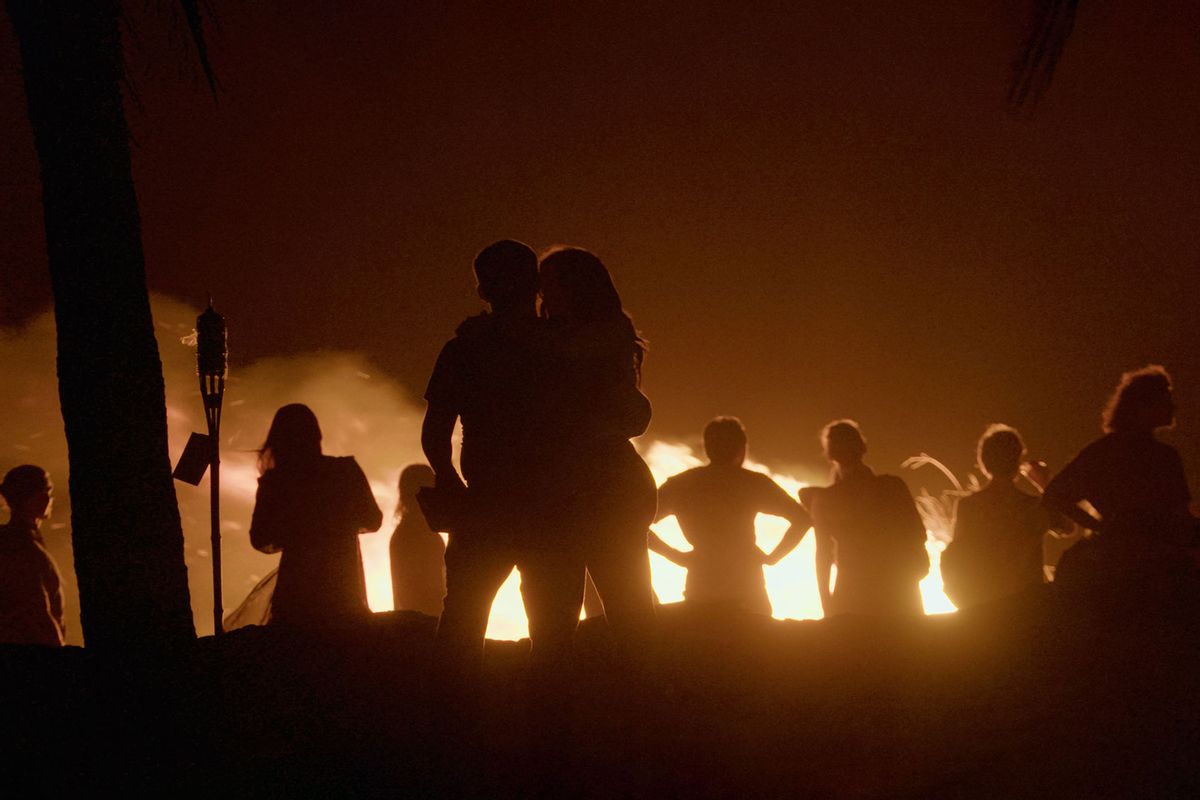Rich people ruin everything. Especially rebellion. None of us needs HBO's "The Anarchists" to deliver that revelation; we're living the truth of that. In that respect, Todd Schramke's documentary series should feel timely.
For those seeking an understanding of the anarchist movement, which requires ignoring the definition espoused by Fox News, Schramke's examination provides clarity without necessarily landing on a single crystallized answer. But if you're looking for a tingly stranger-than-fiction-TV bump, beware. Jumping into this story is akin to snorting a rail only to discover too late that your fun has been cut with itching powder. And once that stuff settles into your membranes, boy howdy is it impossible to rinse out.
"The Anarchists" looks like perfect feel-weird documentary obsession material, grant you. It may not be expressly about a crazy cult or an extraordinary fraudster, but you'll recognize shades of each in Jeff Berwick. Granted, Berwick lacks the dangerous forcefulness of, say, a Ma Anand Sheela, and he's not even close to qualifying as a con artist on par with Fyre Festival CEO Billy McFarland.
RELATED: Libertarians' scary new star: Meet Bryan Caplan, the right's next "great" philosopher
What Berwick offered was real: a bootstrapped gathering that quickly exploded into a destination for wealthy counterculture tourists dabbling in cryptocurrency, including members of the Wu-Tang Clan and former congressman Ron Paul.
Jumping into this story is akin to snorting a rail only to discover too late that your fun has been cut with itching powder.
The slick Canadian liberty-bro describes himself on one of his websites as an anarcho-capitalist, Libertarian, and "freedom fighter against mankind's two biggest enemies, the State and the Central Banks." He presents himself as an amiable "ideas" guy, one of the dozens who pop up on our screens and social media feeds with promises of a life worth emulating.
Schramke follows a subset of self-proclaimed anarchists who answered Berwick's call beckoning them to Acapulco, Mexico, and Anarchapulco, a "freedom conference" he founded in 2015. Conceptualized as a retreat designed to bring the anarchists' community together and explore the philosophy's practice in the real world, it quickly ended up becoming a cryptocurrency sales-a-thon abuzz with catchphrases like, "the liberty space."
But the core values of anarchy found purchase among a few like-minded souls who gravitated to Mexico seeking community. Others only encountered disillusionment, violence, and death, whether as the result of tumbling into the destructive side of a lifestyle that fed their baser impulses, or falling prey to local drug cartels. It doesn't help that Anarchapulco welcomed in a few figures who interpreted anarchy to mean lawlessness, giving them a green light to play out their most dangerous impulses.
Berwick's image doesn't benefit from this aggressive mainstreaming of kookiness; indeed, he's such an ordinary snake oil salesman that his presence quickly degenerates from linchpin to irritant. It's plain to see from the first episode that he'll be the last man standing once everything implodes; he has the generic look of a one-percenter sporting too much hair product, the kind of guy who definitely should not star in a rap video. (Consider that a warning. And be sure to have a pillow nearby to contain your screams.)
In the documentary series, he presents himself as your average millionaire entrepreneur who finds enlightenment by way of an anti-U.S. Reserve conspiracy theory manual. Digesting its teachings and other anti-central banking texts as he boned his way the world on "a 100-country party," he was drawn to Acapulco's reputation for lawlessness.
He settled down there, married an Acapulco native named Kena (who is seen, but not heard), and relaunched as a champion of true freedom, founding a conference in 2015 called Anarchapulco.
 Acapulco, Mexico - "The Anarchists" (Courtesy of HBO)
Acapulco, Mexico - "The Anarchists" (Courtesy of HBO)
"The Anarchists" eventually arranges itself around three major narratives related to Berwick and this event, but before the series finds itself we're introduced to a host of characters gathering around Berwick, a few of whom genuinely believe in anarchy and live its principles. One of the earliest testimonials from Erika Harris, a Black woman fed up with the nine-to-five grind genuinely seeking out a different way to live, makes a persuasive argument that living in some version of a self-governed bliss is possible.
Harris seems genuinely at ease, like she's figured everything out, and maintains that aura of lightness each time we see her.
But she's treated more as a balancing device than an individual with a broader story to tell. That may be because she's one of the few "average," stable people who remain part of whatever anarchist community still exists in Berwick's orbit. She seems like a fine person to spend time with. That doesn't necessarily make her the right character type for a work like this.
Nathan Freeman and his wife Lisa fit that bill. The couple abandoned the United States to live as anarchists in Mexico for the sake of their children, along with Lily Forester and John Galton the assumed names of a young anarchist couple to flee to Anarchapulco to escape drug charges related to cannabis possession.
If you recognize John Galton's name, that could be because you either read the sacred conservative text from which it is derived, or any of the 2019 international headlines about an American fugitive's murder in Mexico. All documentary series of this stripe involve some type of crime surrounded by questions about culpability.
The fact that Schramke got to know the couple and filmed them before their shocking tragedy enables the surviving parties to clear up a few misconceptions about what occurred. Some of it smacks of shameless victim-blaming to protect the Anarchapulco brand, which is what it essentially became by its third and fourth years.
Untangling and organizing these narratives requires a certain amount of discipline even before one factors in cryptocurrency's outsized role in this story.
The Anarchists"... reveals that the dividing line between utopia and hell [is] effectively the same as the one opening splitting democracies around the globe.
But Schramke's ability to wrangle all of these narratives into a coherent form proves to be sporadic and limited at best. This may be a product of the filmmaker's closeness to this ragtag, densely populated community over six years; a few supposedly central players pop up in archival footage or are mentioned in stories without anyone explaining why mentioning them is necessary.
Perhaps his stylistic aim is to capture the chaos of the period he chronicled, but such choices contribute to the flabbiness obscuring the key lessons in this cautionary story, beginning with the community's failure to agree on a single definition of anarchy.
Near the start of the series Schramke shares its definition as "the organization of society on the basis of voluntary cooperation, without political institutions or hierarchical government."
Berwick declares that Anarchapulco has no leader while positioning himself as the area's liege lord. The Freemans play the administrative support to his vision, to a point. Forester and Galton view it as an extension of agorism, which she boils down to "avoid paying taxes and live off your skills." The common theme of "taxation is fraud" is pretty much the only part of the concept with which all are on board. Everything else is fungible.
Forester and Galton become the soul of this community and this series, and their extensively explored stories are the best aspects of later episodes, in which the filmmaker inserts himself into the action more frequently. Through Forester, especially, we gain a greater understanding of how the system fails trauma survivors and why a supposedly stateless way of being would appeal to someone like her.
Meanwhile her friend Jason Henza experience demonstrates why such communities often prove to be mirages.
Want a daily wrap-up of all the news and commentary Salon has to offer? Subscribe to our morning newsletter, Crash Course.
When "The Anarchists" finds some semblance of rhythm, it reveals that the dividing line between utopia and hell was effectively the same as the one opening splitting democracies around the globe – that is, everything falls apart once the haves turn their backs on the have-nots.
A few years ago "The Anarchists" may have seemed more engrossing than it does now when the hokum spewed on Anarchapulco's stage gets heavy play on Fox News and others in the far-right ecosystem. That doesn't mean our society is leaning more towards anarchy but, instead, indicates how normalized conspiracy theories are.
But whatever draw it might muster comes down to something far more basic, explained in the words of Juan Galt (yup, no relation): the anarchy dream crashes against the reality of human conflict, and drama and s**t hitting the fan. When that last part goes down, you can count on the Berwicks of the world to follow their actual truth. "As bad as the world is," he concludes, "you can kinda just ignore it, really, and work on yourself."
"The Anarchists" premieres at Sunday, July 10 at 10 p.m. on HBO. Watch a trailer via YouTube.
More stories like this:
- Why are we so fascinated with cults? They reveal the dirty cultural secrets all around us
- Boomer music fans had more fun
- Inside the Cult of Crypto's latest scam
- Crypto, Trump and toxic male entitlement



Shares